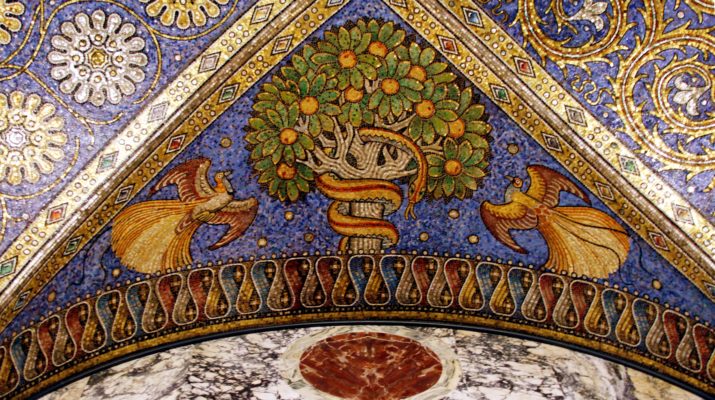BibleHub
1 Now the serpentI wasII more craftyIII than any other wild animalIV
Notes on verse 1a
I “serpent” = nachash. Perhaps from nachash (to practice divination, learn by experience; to hiss as in whispering a spell). This is a serpent or snake. Used for the Serpent in the garden of Eden.
II “was” = hayah. This is to be or become, to happen.
III “crafty” = arum. 11x in OT. From arom (being shrewd or crafty, cunning; properly, being or making bare). This is crafty, shrew, or prudent. It is cunning, but usually in a negative way.
IV “wild animal” = chay + sadeh. Literally “living thing of the field.” Chay is from chayah (to live or keep alive literally or figuratively). This is alive, living, lifetime. It can also be used to describe someone’s age. It can refer to animals, plants, water, or a company or congregation of people. It is life in a very broad sense. Sadeh is literally field, ground, soil, or land. It is used to mean wild like a wild animal.
that the LordV GodVI had made.VII
Notes on verse 1b
V “Lord” = YHVH. Related to “was” in v1. From havah (to be, become) or hayah (see note II above). This is the name of the God of Israel, the self-existent and eternal one, the tetragrammaton. This pronunciation has been lost to time so “Lord” is generally used in its place.
VI “God” = Elohim.
VII “made” = asah. This is to make, do, act, appoint, become in many senses.
He said to the woman,VIII “Did God say, ‘You shall not eatIX from any treeX in the garden’?”XI
Notes on verse 1c
VIII “woman” = ishshah. From ish (man); perhaps from enosh (human, humankind, mortal); from anash (to be weak, sick, or frail). This is woman, wife, or female.
IX “eat” = akal. This is to eat, devour, burn up, or otherwise consume. It can be eating in a literal or figurative sense.
X “tree” = ets. Perhaps from atsah (to shut, fasten, firm up, to close one’s eyes). This is tree or other things related to trees like wood, sticks, or stalks. It can also refer to wood products like a plank or staff or gallows. Additionally, this can refer to a carpenter.
XI “garden” = gan. From ganan (to put a hedge around – generally, protect or defend; to cover or surround). This is a garden in that it is fenced in. It can also be an enclosure.
2 The woman said to the serpent, “We may eat of the fruitXII of the trees in the garden; 3 but God said, ‘You shall not eat of the fruit of the tree that is in the middleXIII of the garden, nor shall you touchXIV it, or you shall die.’”XV
Notes on verses 2-3
XII “fruit” = peri. From parah (to bear fruit, grow, be fruitful, increase; bearing fruit in a literal or figurative sense). This is fruit or reward.
XIII “middle” = tavek. This is among, middle, in the midst, the center. Perhaps, properly, to sever.
XIV “touch” = naga. This is touch, reach, arrive, come near, strike. This is touching for any reason including sexual or violent.
XV “die” = mut. This is to die in a literal or figurative sense. It can also refer to being a dead body.
4 But the serpent said to the woman, “You will not die;XVI 5 for God knowsXVII that whenXVIII you eat of it
Notes on verses 4-5a
XVI “die” = mut + mut. Same as “die” in v3. See note XVI above. The word is repeated twice – the first time as an Infinitive Absolute. The Infinitive Absolute serves to emphasize the sentiment of the word. It is rather like Foghorn Leghorn’s speech pattern, “I said, I said.”
XVII “knows” = yada. This is to know, acknowledge, advise, answer, be aware, be acquainted with. Properly, this is to figure something out by seeing. It includes ideas of observation, recognition, and care about something. It can be used causatively for instruction, designation, and punishment.
XVIII “when” = yom. Literally “in the day.”
your eyesXIX will be opened,XX and you will be like God, knowing goodXXI and evil.”XXII
Notes on verse 5b
XIX “eyes” = ayin. This is eye in a literal or figurative sense so eye, appearance, favor, or a fountain (the eye of the landscape).
XX “opened” = paqach. This is open, as opening one’s senses, particularly eyes. So, figuratively this can refer to being watchful.
XXI “good” = tob. From tob (to be pleasing, to be good). This is good, beautiful, pleasant, agreeable, bountiful, at ease. This word is used for goodness as a concept, a good thing, a good person. This can refer to prosperity and welfare as well as joy, kindness, sweetness, and graciousness. So, this is ethically good, but also enjoyably good.
XXII “evil” = ra’. From ra’a’ (to be evil, bad, afflict; properly, to spoil – to destroy by breaking into pieces; figuratively, to cause something to be worthless; this is bad in a physical, social, or moral sense; that which displeases, to do harm or mischief, to punish or vex). This is bad, disagreeable, that which causes pain, misery, something having little or no value, something that is ethically bad, wicked, injury, calamity. This refers to anything that is not what it ought to be – a natural disaster, a disfigurement, an injury, a sin.
6 So when the woman sawXXIII that the tree was good for food,XXIV and that it was a delightXXV to the eyes, and that the tree was to be desiredXXVI to make one wise,XXVII she took of its fruit and ate; and she also gave some to her husband,XXVIII who was with her, and he ate.
Notes on verse 6
XXIII “saw” = raah. This is to see in a literal or figurative sense so stare, advise, think, view.
XXIV “food” = maakal. Related to “eat” in v1. From akal (see note IX above). This is food, something edible.
XXV “delight” = taavah. From the same as avah (to desire, crave, wish for, lust after). This is what is desirable, a delight, greedy, satisfaction, a charm.
XXVI “desired” = chamad. This is to desire or delight in someone or something. It can also mean something that is precious or coveted. So, it can also refer to lust.
XXVII “make one wise” = sakal. This is to consider or be prudent and so it can mean to instruct or be an expert. It can also mean dealing prudently, which implies success and prospering. This verb presumes intelligence of the subject. In one form of the verb, it can mean laying cross-wise.
XXVIII “husband” = enosh. Related to “woman” in v1. See note VIII above.
7 Then the eyes of bothXXIX were opened, and they knew that they were naked;XXX and they sewed fig leavesXXXI togetherXXXII and made loinclothsXXXIII for themselves.
Notes on verse 7
XXIX “both” = shenayim. From sheni (double, again, another, second); from shanah (to fold, repeat, double, alter, or disguise). This is two, both, second, couple.
XXX “naked” = erom. Related to “crafty” in v1. 10x in OT. From ur (to be made naked, exposed, or bare) OR from arom (see note III above). This is nakedness or nudity.
XXXI “leaves” = aleh. 18x in OT. From alah (to go up, climb, to be high; to arise in a literal or figurative sense). This is leaf, branch, or foliage.
XXXII “sewed…together” = taphar. 4x in OT– including a time to sew in Ecclesiastes 3:7. This is to sew together or women who sew.
XXXIII “loincloths” = chagor. 7x in OT. From chagar (to gird, bind, or arm; using a belt to gather up one’s garment so that it’s easier to run or move quickly). This is a loincloth, belt, or armor.
Image credit: “Tree of Eden” at the Palatine Chapel in Aachen, Germany. Photo by Jose Luiz, 2017.




